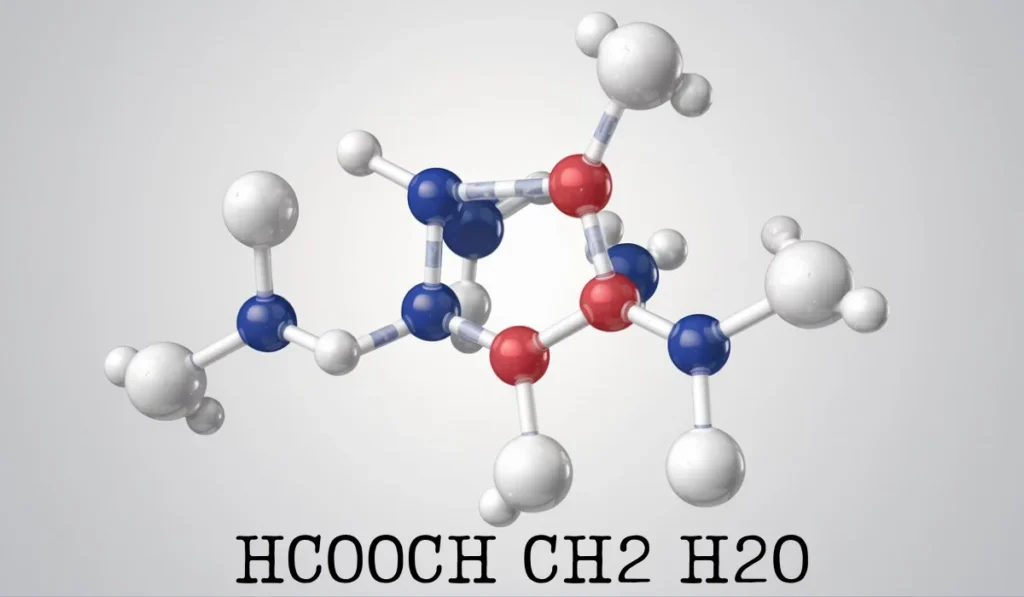Understanding chemical interactions is a foundation for progressing fields like organic chemistry, biochemistry, and industrial applications. A compound of interest, HCOOCH CH2 H2O, has been studied for its structural uniqueness and versatile properties. But what exactly is this compound, and why is it significant?
This blog post unpacks the details of HCOOCH CH2 H2O, breaking down its components, structural representation, formation, properties, and notable occurrences in various contexts. Whether you’re a chemistry enthusiast, a science student, or a researcher, this deep-dive analysis will guide you through the key characteristics and applications of this chemical compound.
Table of Contents
What is HCOOCH CH2 H2O?
HCOOCH CH2 H2O is the chemical representation of a hydrated methyl formate. Methyl formate, also known as methyl methanoate, is an organic compound widely recognized for its role as a flavoring agent, solvent, and precursor in industrial syntheses. The addition of water (H2O) to its molecular structure hints at a hydrated or altered form of the compound, potentially changing its chemical behavior or applications.
This molecule holds significance across organic synthesis, greenhouse gas studies, and as a transient species in chemical reactions.
Breaking Down the Components
To better understand HCOOCH CH2 H2O, we first need to analyze its individual building blocks and functional groups.
- HCOO represents the formate ion (HCOO-), a derivative of formic acid (HCOOH).
- CH signifies a single carbon bonded to hydrogen.
- H2O indicates the presence of water molecules.
The overall molecule can be conceptualized as a derivative of methyl formate interacting with water to create a hydrated complex. Such chemical associations can alter properties like polarity, solubility, or reactivity.
Structural Representation
Drawing the Molecule
Structurally, HCOOCH CH2 H2O can be outlined by focusing on its ester bonds and hydroxyl functionality from the water. It consists of the formate group attached via an ester bond to a methyl group, expanded by a water molecule.
Visually, the molecule can be depicted as follows (simplified): HCOO-CH-CH + H2O This structure highlights the key functional groups contributing to its stereochemistry and physical characteristics.
Stereochemistry
Stereochemistry in esters like methyl formate introduces spatial considerations. While the compound doesn’t inherently hold chiral centers, the molecular geometry, especially with water addition, affects its spatial configuration. Isomers or altered forms may exhibit distinct characteristics arising from hydrogen bonding or molecular interactions.
How Is HCOOCH CH2 H2O Formed?
The synthesis of HCOOCH CH2 H2O can occur through controlled chemical reactions.
Chemical Reactions
One common pathway includes the hydration of methyl formate. This process involves combining methyl formate (HCOOCH3) with water under specific conditions. A basic reaction would look like this:
“`
HCOOCH3 + H2O → HCOOCH CH2 H2O
“`
The reaction is often catalyzed by acids or bases, enabling efficient hydration while ensuring minimal byproducts.
Occurrence and Applications
This substance is most commonly observed in environments where methyl formate interacts with humid conditions or chemically active solvents. Some critical applications include its involvement in industrial processes, research in biochemistry, and targeted greenhouse gas reduction strategies.
Biochemistry
While direct biological activity for HCOOCH CH2 H2O has not been regularly documented, its precursor, methyl formate, plays a significant biochemical role. It has been detected in interstellar mediums, potentially contributing to the prebiotic chemistry that supports the origins of life.
Industrial Use
Industrially, the compound’s hydrated form can diversify its use as both a solvent for complex reactions and a stabilizer in formulations. Its role may also extend to flavoring and polymer chemistry owing to its reactivity and volatile nature.
Chemical Properties
Understanding the intrinsic properties of HCOOCH CH2 H2O is crucial when leveraging its capabilities in experimental and practical settings.
Reactivity
- Ester Hydrolysis: The molecule reacts under acidic or basic environments to hydrolyze, producing methanol and formic acid as products.
- Hydrogen Bonding: The hydration introduces the ability to form hydrogen bonds, which impacts how the molecule interacts with solvents and reactants.
- Thermal Stability: Heat can decompose hydrated forms into simpler chemical structures under controlled conditions.
Solubility and Polarity
Due to the polar nature of both the ester and water components, HCOOCH CH2 H2O displays significant solubility in polar solvents like water and methanol. This characteristic makes it a suitable candidate for aqueous reactions and emulsions.
The slightly increased polarity from the water molecule boosts its versatility in chemical formulations, particularly in emulsifiers and solvents for laboratory usage.
Why Does This Reaction Matter?
Understanding molecules like HCOOCH CH2 H2O offers deeper insights into organic synthesis, chemical stability, and cross-disciplinary applicability.
- Educational Value – The molecule serves as a prime example for students studying ester hydration and reactivity.
- Industrial Use – Applications in adhesives, coatings, and flavors rely on hydrated chemical forms to modify performance and yield desired properties.
- Future Potential – Investigating similar reactions may pave the way for discovering unique intermediaries critical for pharmaceuticals or advanced materials.
Leverage Chemistry Insights for Broader Discoveries
HCOOCH CH2 H2O represents a small piece of a much broader field of chemical exploration. Its unique properties and applications make it an excellent case study for science students, chemistry researchers, and those interested in practical industrial chemistry.
By studying chemical nuances with molecules like this, we gain insight into the molecular dynamics that shape research and applications, both in a laboratory setting and beyond.
Conclusion
HCOOCH CH2 H2O is a compound rich in complexity, playing various roles across scientific disciplines. Whether through its structural intricacies, formation mechanisms, or applications in biochemistry and industry, this compound’s significance cannot be understated. Understanding HCOOCH CH2 H2O is crucial for those interested in chemistry, offering a glimpse into the intricate workings of molecular interactions and the foundation for innovation in numerous applications.


 Kingxomiz: Exploring Its Influence & Significance
Kingxomiz: Exploring Its Influence & Significance  Top Renovator Tips for Successful Property Renovation in Dubai
Top Renovator Tips for Successful Property Renovation in Dubai  Enrica Cenzatti: A Look Into Her Life & Legacy
Enrica Cenzatti: A Look Into Her Life & Legacy  Paige Skinner Jesse Fink: A Closer Look at Their Story
Paige Skinner Jesse Fink: A Closer Look at Their Story  Consumed by Rage Weak Aura: Optimize Your Gameplay
Consumed by Rage Weak Aura: Optimize Your Gameplay  Camegle: The Next Big Thing in Online Exploration
Camegle: The Next Big Thing in Online Exploration